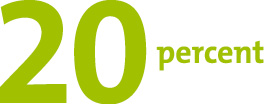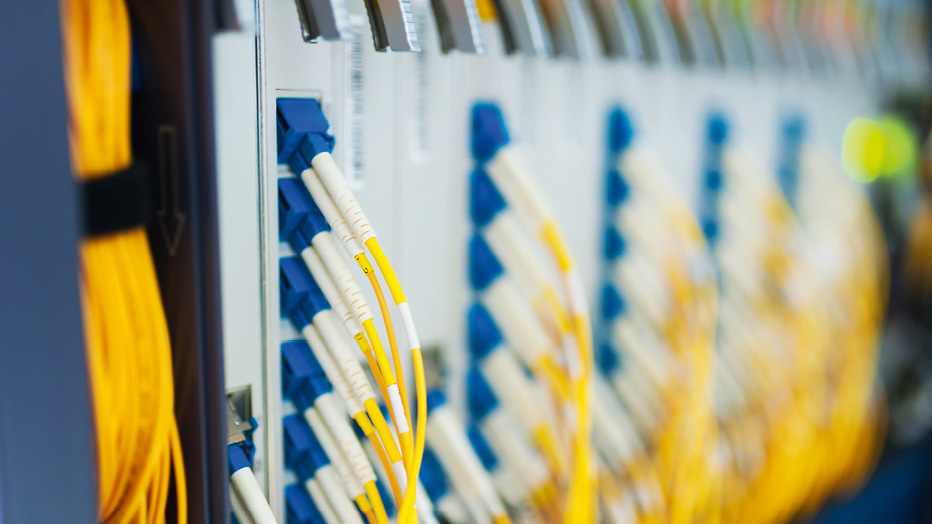Four fifths of the entire internet traffic in Germany is effected via the exchange point in Frankfurt. One of the most efficient digital infrastructures in the world is supported by a wide array of infrastructure and service providers.
Starting as a staging area for telecommunications, where cables from all over Germany were bundled, Frankfurt has become one of the most important locations in the global digital infrastructure. In 1995, the Internet exchange point DE-CIX started operations in Frankfurt and, measured in data throughput, is now the biggest Internet exchange in Europe with the domain registry DENIC and numerous Internet data centres located here. Over 35 commercial providers, including six big international companies, operate data centres at more than 50 locations. Many of these data centres provide services for the industrial and financial sectors which are strongly represented in Frankfurt.
An increasingly important economic factor
Information and Communication Technology (IKT) has become an important economic factor for Frankfurt and, with the ongoing digitalisation, the branch will continue to grow.
In industry, for example, production facilities are increasingly networked and processes digitalised (Industrie 4.0). In the “Internet of Things“ devices, vehicles and buildings communicate with each other and with the Internet, while ICT services are increasingly being outsourced in central data centres (Cloud-Computing). These developments will lead to rapidly growing data volumes.

betrug im Jahr 2013 der Anteil der Server- und Rechenzentren am gesamten Frankfurter Jahresstromverbrauch.
Protecting the climate despite increasing data streams
Frankfurt’s leading role in digital infrastructure is, at the same time, linked with challenges for the city. ICT has a huge, constantly growing, appetite for energy. In 2010, server- and data centres accounted for about 10 percent of Frankfurt’s total energy consumption. This is now about 20 percent.
Concentrating computing power in large central data centres, instead of in several smaller facilities, leads to significantly enhanced energy efficiency while operators also develop their own strategies for reducing energy consumption. Frankfurt’s „Masterplan 100 % Climate Protection”, whose goal is to convert Frankfurt’s energy supply to renewable energies by 2050 (page 50), has pointers on how efficiency measures can save energy in data centres and on how using waste heat can increase overall efficiency (Green IT).
Guaranteeing the infrastructure at the location Frankfurt
Frankfurt must assert itself as a location for the digital economy against stiff international competition. An adequate, secure energy supply and an efficient digital infrastructure are key location factors for the ICT branch and the developing Industrie 4.0.
Frankfurt’s “Masterplan Industrie” (page 8) contains approaches to securing and developing commercial areas which meet these requirements. The Board of Industry, which helped prepare the “Masterplan Industrie“, also recommends developing one of the existing commercial areas to a “digital commercial area“. The model project would make areas available and develop an infrastructure with an express network connection for Industrie 4.0.
Digital economy interest group
Digital Hub FrankfurtRheinMain e.V. is a regional interest group representing the digital economy. The network of data centre operators, ICT, financial, business, location and technology specialists represents the providers and users of the digital infrastructure in the FrankfurtRheinMain metropolitan region. Mainova’s subsidiary NRM Netzdienste Rhein-Main GmbH, as a distribution network operator with a high-availability energy supply, is also a member of the interest group. The organisation addresses the fields of innovation in the network economy and advocates that, in the future, Frankfurt should remain Europe’s central Internet exchange point and data centre location.
The organisation has its roots in a founding initiative of the City of Frankfurt, the Frankfurt Economic Development GmbH, the Institute for New Media (INM) and the data centre service provider Interxion Germany GmbH.
Environment Department
Tel +49 (0)69 212 39100 – Environment hotline
umwelttelefon(at)stadt-frankfurt.de


